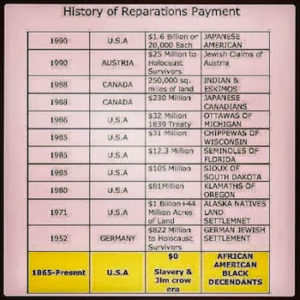
*Reparations for slavery against Africans in America are addressed on this date.
On this date in 1989, (then) Michigan Representative John Conyers introduced H.R.3745, Commission to Study Reparation Proposals for African Americans Act, to the 101’s Congress. He reintroduced this bill annually ever since. In the United States, there have been movements to achieve reparations for those held in involuntary servitude or sometimes their descendants. There is a growing modern movement to donate funds achieved in reparations efforts, not to the descendants of those held as slaves in prior generations, but to donate them to those freed from slavery in the current generation, in other countries and circumstances.
In general, reparation for being held in slavery is handled as a civil law matter in almost every country. This is often decried as a severe problem since slaves are precisely those people who have no access to the legal process. Systems of fines and reparations paid from fines collected by authorities rather than in civil courts have been proposed to alleviate this in some nations. In the United States, the reparations movement often cites the 40 acres and a mule decree.
Recent efforts have also targeted businesses that profited from the slave trade and issued insurance to slaves. AFRICAN DEMANDS In Africa, Ghana's 2nd World Reparations and Repatriation Truth Commission was last convened in 2000. Its deliberations concluded with a Petition being served in the International Court at the Hague for $777 trillion US dollars against the United States of America (USA), Canada, and European Union Members.
This is for the Unlawful Removal And Destruction Of Petitioners' Mineral And Human Resources From The African Continent Between 1503 A.D. and the End Of The Colonialism Era—1957 through the 1960s. This was the first time a price has been put on African Reparations.